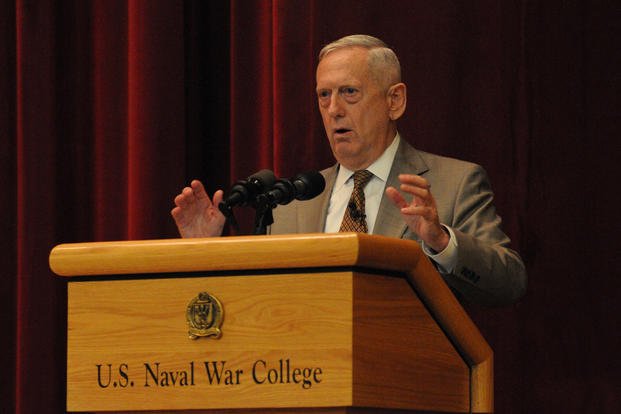Two civilian defense experts gave a unanimous recommendation to senators on Tuesday: Preserve protection of civilian control of the military, but make an exception so retired Marine Corps Gen. James Mattis can serve as secretary of defense.
Two days ahead of Mattis' confirmation hearing before the Senate Armed Services Committee, lawmakers on the panel met to discuss the importance of civilian control of the military and the implications of confirming Mattis. While current law requires nominees for secretary of defense to have spent at least seven years out of uniform, Mattis, a former commander of U.S. Central Command, retired in 2013, fewer than four years ago.
Both experts said the law served as a safeguard for the nation in protecting health civil-military relations and diversity of viewpoints. However, they said, Mattis' personal qualities and leadership and the circumstances the nation found itself in justified a waiver -- not unlike the reasoning that was used to make the only other exception to the law: Gen. George C. Marshall, who was nominated for defense secretary by President Harry Truman in 1950.
"I have known Gen. Mattis for over a decade," Eliot A. Cohen, professor at Johns Hopkins School of Advanced International Studies and former counselor of the Department of State, told the committee. "He has proven himself to be a man of exceptional character and judgment, and I would trust him to conceive and execute policy as any of us would wish. He is not Gen. Marshall -- but he is indeed a man of similar integrity and soundness, and of very wide experience."
For Cohen, who during the presidential campaign helped to organize two joint letters from Republican national security leaders voicing their concern about Donald Trump as a candidate, Mattis would also provide a check on the administration during a time of global instability and conflict.
"There is no question in my mind that a Secretary Mattis would be a stabilizing and moderating force, preventing wildly stupid, dangerous, or illegal things from happening," he said.
Kathleen Hicks, the Kissinger Chair and director of the International Security Program at the Center for Strategic and International Studies, who said she supported Mattis for defense secretary based on her own professional interactions with him and her belief that the nation currently had a healthy civilian-military balance, nonetheless warned that confirming him would preclude any similar waivers for decades to come.
"For the next 20 years, I would not expect to see us back here," she said.
Mattis has received support on both sides of the political aisle from lawmakers who voice respect for his military record and reputation. One notable exception has been committee member Sen. Kirsten Gillibrand, a Democrat from New York who has publicly said she will oppose a waiver. She called on the experts to highlight areas in which the committee would have to be vigilant to ensure a Defense Department with Mattis at the helm would maintain a proper balance of civilian authority.
"You both outlined the importance of the diversity and we now lack that," she said.
Sen. Richard Blumenthal, a Marine veteran who spoke of his personal respect for Mattis, also voiced uncertainty about making an exception to the rule of civilian control.
"I'm concerned that a waiver here would set a precedent," the Connecticut Democrat said.
None of the other committee members indicated a plan to oppose the waiver for Mattis, though Sen. Joni Ernst, a Republican from Iowa and an Army National Guard veteran herself, said she wanted to secure specific assurances from him during his Thursday confirmation hearing before committing her support.
Sen Angus King, an Independent from Maine, said he was willing to make an exception because of the widespread commitment to keeping civilian control as a rule in place.
"I have decided to support this amendment, because I don't think it will make bad law because of the narrow way that it's drafted," King said. "I'm comforted by this language."
The committee's chairman, Arizona Republican Sen. John McCain, maintained his staunch support for Mattis, as he has since his nomination.
"I believe James Mattis is an exceptional public servant, worthy of exceptional consideration," he said.
-- Hope Hodge Seck can be reached at hope.seck@military.com. Follow her on Twitter at @HopeSeck.





























